Governor Lamont Announces Kiana Foster-Mauro Is Connecticut’s 2024 Teacher of the Year
https://portal.ct.gov/Office-of-the-Governor/News/Press-Releases/2023/10-2023/Governor-Lamont-Announces-Kiana-Foster-Mauro-Is-2024-Teacher-of-the-Year
Many Global Corporations Will Soon Have to Police Up and Down their Supply Chains as EU Human Rights ‘Due Diligence’ Law Nears Enactment
https://theconversation.com/many-global-corporations-will-soon-have-to-police-up-and-down-their-supply-chains-as-eu-human-rights-due-diligence-law-nears-enactment-202706
The Electric Vehicle Revolution: From a Human Rights Angle
Thursday, April 20, 2023
12:00pm - 1:15pm
Hybrid Event
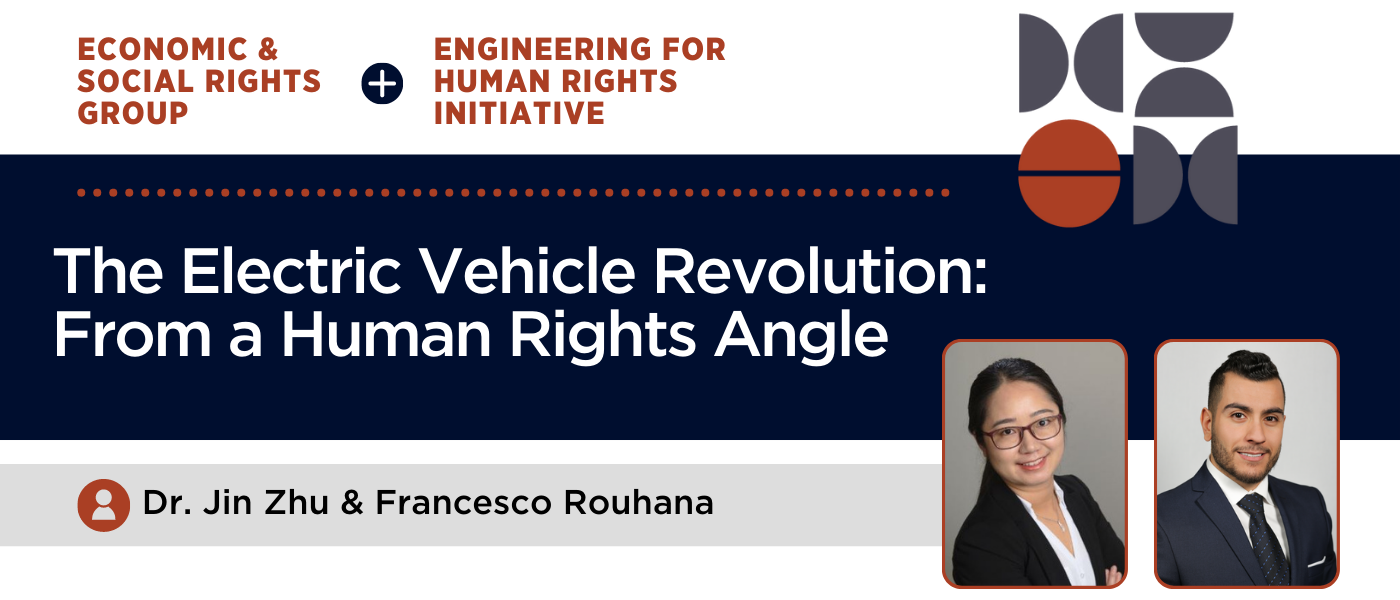
About This Event
Abstract: Electric vehicles (EVs) have evolved rapidly owing to technological advancements and a growing interest in renewable energy to eliminate transportation’s dependency on fossil fuels and mitigate the effects of climate change. While EVs could revolutionize the transportation industry, they could jeopardize social equity and environmental stewardship efforts. Current studies on transportation electrification often fail to evaluate the EV revolution implications in human rights terms. International human rights law provides universally accepted norms, standards, baseline indicators, and modes of inquiry and reporting that could significantly advance and sharpen impact analysis. In this study, we explored the potential human rights implications that EVs pose for individuals and societies throughout their life cycle. Using the Universal Declaration of Human Rights and other human rights-based treaties as our baseline, we analyzed the existing and likely EVs’ impacts on human rights. We identified potential measures to address human rights violations. Stakeholders (governments, private sectors, civil society) need to work closely together to make the transition to low-carbon transportation more equitable and sustainable.
This event is co-sponsored by the Economic & Social Rights Group and the Engineering for Human Rights Initiative at the Gladstein Family Human Rights Institute.
Presenters
Dr. Jin Zhu
Assistant Professor
Civil and Environmental Engineering Department
University of Connecticut
Francesco Rouhana
Ph.D. Student
Civil and Environmental Engineering Department
University of Connecticut
About Dr. Jin Zhu
Dr. Jin Zhu is an Assistant Professor with the Civil and Environmental Engineering Department. Prior to joining UConn, she was a postdoctoral fellow at Zachry Department of Civil Engineering at Texas A&M University and before that she received her PhD in Civil Engineering and a Master in Public Administration at Florida International University. Her current research portfolio includes the complex systems engineering and management; system-of-systems integration; resilience quantification and simulation in infrastructure systems; and resilient communities. Her work on performance assessment of complex construction projects as system-of-systems has received the Best Paper Award from 2015 ASCE International Workshop on Computing in Civil Engineering, and 2nd Place Best Poster Award from 2016 ASCE Construction Research Congress. Dr. Zhu is the director of Resilient Interdependent Systems Engineering (RISE) Lab at UConn. The RISE Lab focuses on research that advances knowledge, methods, and data within and across diverse disciplines including civil engineering, complex systems science, network and graph theory, decision theory, organizational theory, and computer science.
About Francesco Rouhana
Francesco Rouhana is a PhD student in the CEE Department at UConn. He holds a bachelor degree in Civil Engineering and a master degree in Civil Engineering with a concentration in Transportation and Urban Planning from Notre Dame University – Louaize, Beirut, Lebanon. His research interests include resilience of civil infrastructure systems, disaster risk reduction, response and recovery.
Human Rights & Cultural Resistance through Theatre
Wednesday, April 19, 2023
12:00 pm - 1:30 pm
Nafe Katter Theatre
UConn Fine Arts Complex
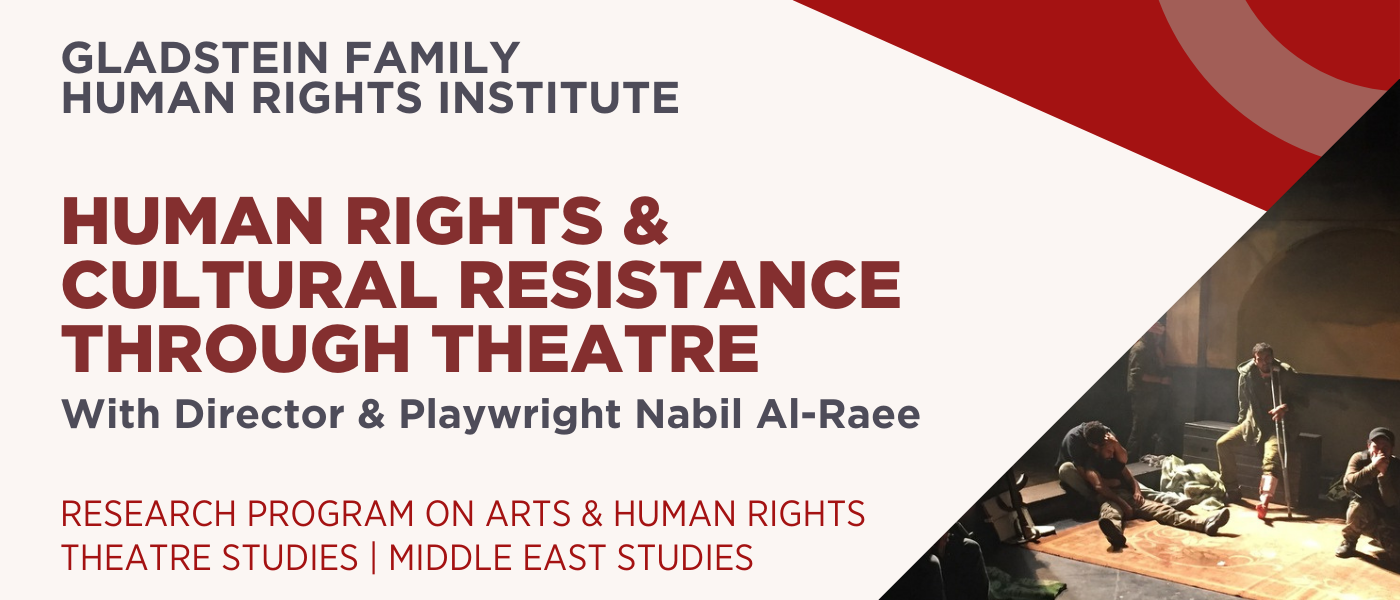
About this Event:
Nabil Al-Raee, a prominent director and playwright from the West Bank, will be visiting UConn Storrs April 17 - 19. On Wednesday, April 19, Al-Raee joins us in the Katter Theatre for a presentation entitled Human Rights and Cultural Resistance through Theatre. Al-Raee will present images and speak about several Palestinian productions including, The Siege, The Caretaker, by Harold Pinter, I Am My Own Enemy, a deconstruction of the Medusa Myth, and Suicide Note, based on Sarah Kane's 4.48 Psychosis.
The presentation will also include a public interview with Distinguished Professor Gary M. English in which he will discuss the cultural and political situation in the West Bank, the function of theatre as resistance, and the theatre methods and techniques used in theatre training within a conflict zone. Additional topics will include the use of personal narrative as dramaturgy and the development of theatre based on devised theatre practices.
This event and Nabil's residency are co-sponsored by Theatre Studies, Middle East Studies, and the Research Program on Arts & Human Rights.
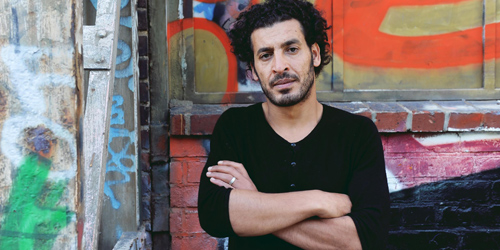
About Nabil Al-Raee:
Nabil Al-Raee served on the artistic staff of The Freedom Theatre in Jenin, West Bank, Palestine for over a decade and as artistic director from 2013 - 2019. He led the creation of a three-year curriculum in acting that, still in place, focuses on the development of he and colleague Micaela Miranda refer to as an "actor of resistance." The approach focuses on the development and performance of personal narrative within a clear political, social and personal context. Al-Raee also developed and wrote several plays including The Siege, that toured extensively in the U.K. and played at the Skirball Center at NYU. Other productions include Suicide Note, (based on 4.48 Psychosis) I Am My Own Enemy, (a deconstruction of the Medusa Myth) and an adaption of Animal Farm by George Orwell. As an actor he appeared most recently in the film 200 Meters, starring Ali Suliman, and directed by Ameen Nayfeh.
Nabil studied theatre and music in Palestine and Tunisia, is an accomplished musician, actor, director and playwright. He is also an expert on Palestinian arts, culture and politics, cultural resistance, political drama and grew up as a refugee in the Aroub Refugee Camp near Bethlehem.
Connections, Gender, and Access to State-Facilitated Private-Sector Development: Evidence from a Field Experiment in Senegal
Thursday, April 13, 2023
2:00 pm - 3:15 pm
Hybrid Event
Dodd Center for Human Rights - Room 162
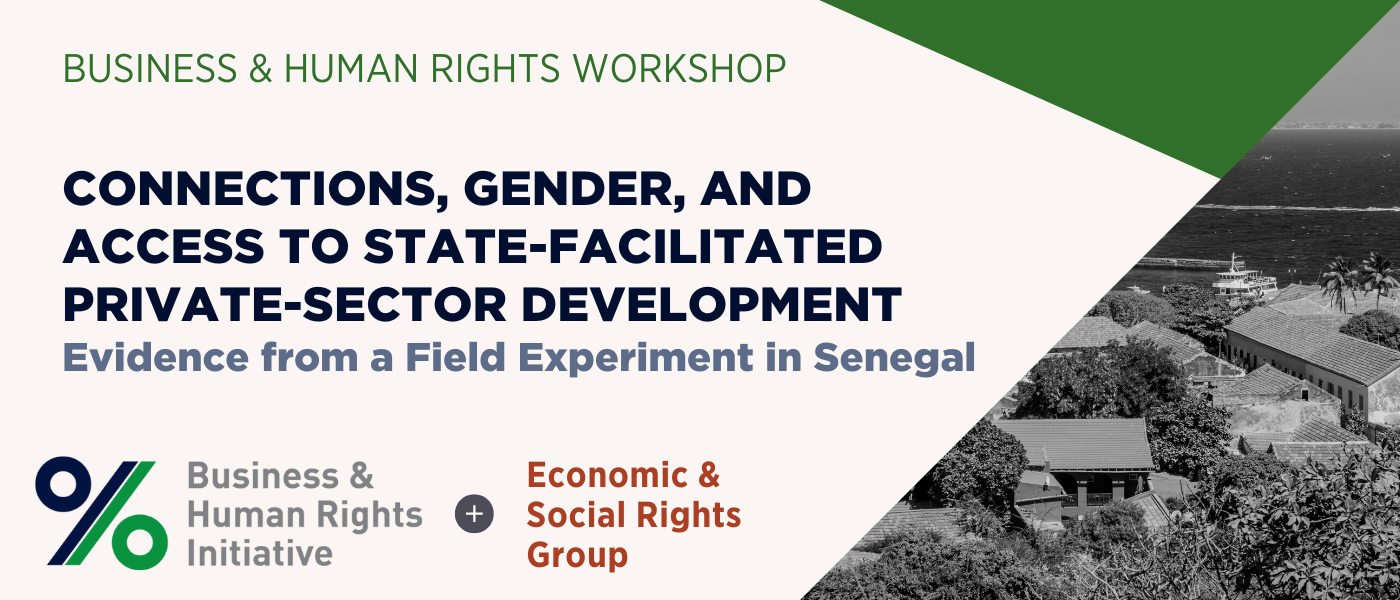
About This Workshop:
The Business and Human Rights Workshop is dedicated to the development and discussion of works-in-progress and other non-published academic research.
In developing countries, access to opportunities within the private sector are often unequally distributed. Disproportionate advantages may accrue to those with connections to the state or to those with higher social standing. In this paper, I causally estimate the impact of political and social determinants of access to private-sector development under unevenly enforced rule of law. I do so by implementing a field experiment in Senegal in which I operate a registered business and randomize political connections and gender during entrepreneurs’ applications for valuable business permits at municipal councils. I find that politically connected applicants deal with fewer steps in the application process and are more likely to successfully deposit an application. Women, by contrast, are more likely to have their applications rejected, despite following the same procedures as men. These results highlight the specific steps along the institutional pathway where political and social connections are most influential, and offer causal evidence to inform policy to reduce the barriers facing entrepreneurs in developing countries.
 Presenter:
Presenter:
Abhit Bhandari
Department of Political Science
Temple University
This workshop will take place in-person and on Zoom and will not be recorded. Please register to attend.
This event is hosted by the Business & Human Rights Initiative, a partnership between Dodd Human Rights Impact, the UConn School of Business, and the Gladstein Family Human Rights Institute. It is co-sponsored by the Research Program on Economic & Social Rights.
Arts & Human Rights Faculty Seminar Series
March 9, April 4, & April 19, 2023
In-person: The Dodd Center for Human Rights - Room 162
Online: Zoom
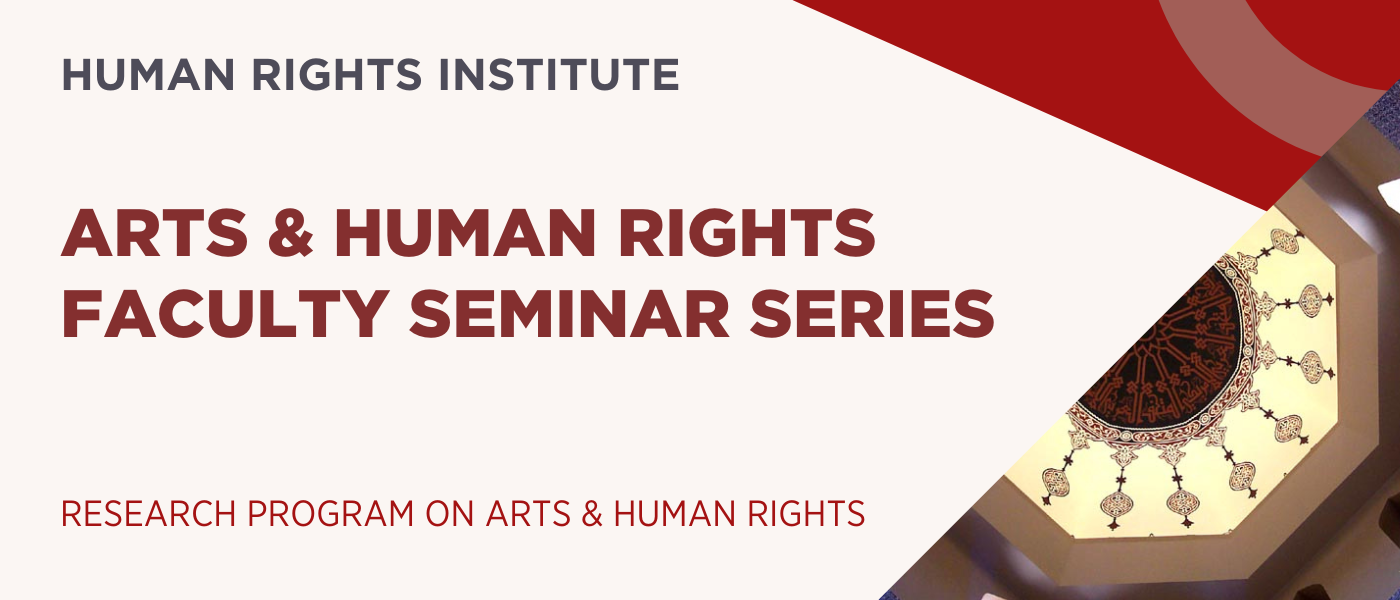
About the Series:
Join us for one or all discussions in this three-part series of faculty seminars sponsored by the Research Program on Arts and Human Rights. This series highlights the innovative work being done at the intersection of the arts and human rights among our faculty. All are encouraged to attend!
All sessions are hosted in-person with the option to join by Zoom. We kindly ask that you register to attend. Those attending in-person can join us in Conference Room 162 of The Dodd Center for Human Rights, while those joining by Zoom will receive a link to join upon registration.
Sessions
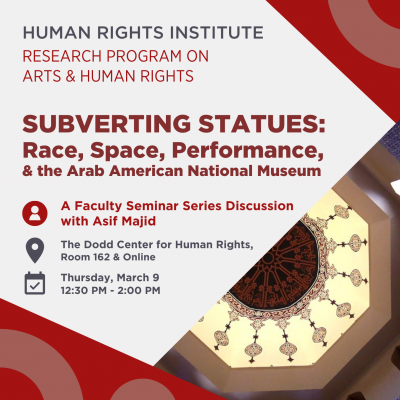 Subverting Statues: Race, Space, Performance, and the Arab American National Museum
Subverting Statues: Race, Space, Performance, and the Arab American National Museum
Thursday, March 9, 2023 | 12:30 pm - 2:00 pm
Asif Majid
In 2005, the Arab American National Museum (AANM) opened on the site of a former furniture store, opposite the former city hall building for the city of Dearborn, MI, a city outside Detroit that is often referred to as “the heart of Arab America.” At its founding, the museum also sat across the street from a statue of the former, long-serving, racist Dearborn mayor Orville Hubbard, an individual who explicitly referred to Arabs as “n******”; the Hubbard statue appeared to be gesturing to the museum. Drawing on my work at AANM this academic year – as an Arts Research with Communities of Color Fellow supported by the Social Science Research Council and The Wallace Foundation – in this talk, I ask: what performative, racial, and political power does the geography of the museum carry, particularly in reference to Dearborn’s racist history and spatial politics? And what might it mean to read politico-aesthetic institutions of color as a subversion of monuments to white supremacy?
About Asif Majid
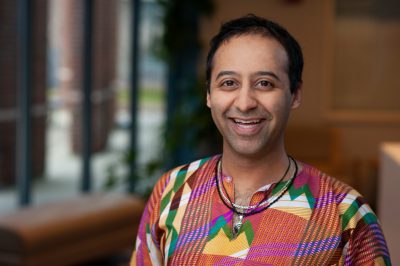 Asif Majid is a scholar-artist-educator working at the intersection of racialized sociopolitical identities, multimedia, marginality, and new performance, particularly through devising community-based participatory theatre and making improvisational music. Currently, he serves as Assistant Professor of Theatre and Human Rights at the University of Connecticut. Prior to UConn, Asif was a Mellon/ACLS Public Fellow with the San Francisco Arts Commission and a Lab Fellow with The Laboratory for Global Performance and Performance.
Asif Majid is a scholar-artist-educator working at the intersection of racialized sociopolitical identities, multimedia, marginality, and new performance, particularly through devising community-based participatory theatre and making improvisational music. Currently, he serves as Assistant Professor of Theatre and Human Rights at the University of Connecticut. Prior to UConn, Asif was a Mellon/ACLS Public Fellow with the San Francisco Arts Commission and a Lab Fellow with The Laboratory for Global Performance and Performance.
Asif has published in multiple peer-reviewed academic journals, as well as numerous books and media outlets. His research interests include performance ethnography, the intersection of Islam and performance, community-based devising, social justice performance, the ethnography of race, and applied theatre. Asif’s US performance credits include work with the Kennedy Center, Convergence Theatre, and Theatre Prometheus, and his UK performance credits include the Royal Exchange Theatre, Action Transport Theatre, and Unity Theatre. Asifearned his PhD in Anthropology, Media, and Performance from The University of Manchester; his MA in Conflict Resolution from Georgetown University; and his self-designed BA in Interdisciplinary Studies: Global Peace Building and Conflict Management from UMBC. He is online at www.asifmajid.com.
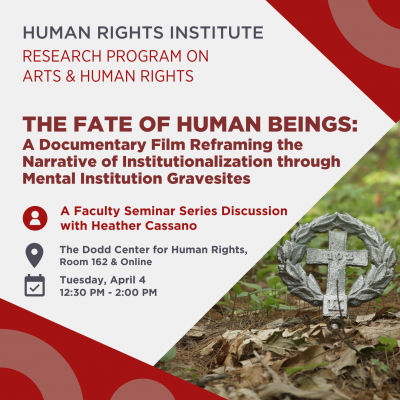 The Fate of Human Beings: A Documentary Film Reframing the Narrative of Institutionalization through Mental Institution Gravesites
The Fate of Human Beings: A Documentary Film Reframing the Narrative of Institutionalization through Mental Institution Gravesites
Tuesday, April 4, 2023 | 12:30 pm - 2:00 pm
Heather Cassano
The Fate of Human Beings is a documentary film uncovering the stories of people with disabilities and mental illnesses who are buried in unnamed graves in mental institution cemeteries across the United States. Through a multiple narrative approach utilizing archival and present-day material, the film unpacks the ramifications of these cemeteries, seeking to understand our past and present relationships with the “otherness” of those interred. This talk will show work-in-progress scenes from The Fate of Human Beings and discuss the research behind the project, including the first database to comprehensively catalog institution cemeteries in the United States.
About Heather Cassano
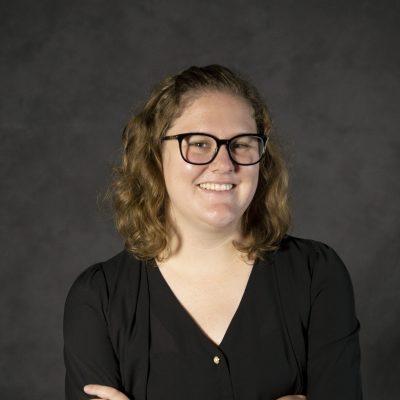 Heather Cassano is a documentary filmmaker and Assistant Professor of Film/Video at the University of Connecticut. She has presented work in the forms of still photography, multi-channel video, and short and feature films. Her films blend an observational style with deeply personal narratives, striving to tell authentic stories through her personal experiences. Heather’s first feature documentary THE LIMITS OF MY WORLD (2018), followed her severely autistic brother Brian as he transitioned from the school system into adulthood. The film screened at numerous festivals internationally, winning three Best Documentary awards and a Jury Prize. Heather is now working on her second feature documentary THE FATE OF HUMAN BEINGS, which uncovers the stories of people with disabilities and mental illnesses who are buried in unnamed graves in mental institution cemeteries across the United States. The film has been supported by Massachusetts Humanities, the LEF Foundation, the UConn Humanities Institute, and others.
Heather Cassano is a documentary filmmaker and Assistant Professor of Film/Video at the University of Connecticut. She has presented work in the forms of still photography, multi-channel video, and short and feature films. Her films blend an observational style with deeply personal narratives, striving to tell authentic stories through her personal experiences. Heather’s first feature documentary THE LIMITS OF MY WORLD (2018), followed her severely autistic brother Brian as he transitioned from the school system into adulthood. The film screened at numerous festivals internationally, winning three Best Documentary awards and a Jury Prize. Heather is now working on her second feature documentary THE FATE OF HUMAN BEINGS, which uncovers the stories of people with disabilities and mental illnesses who are buried in unnamed graves in mental institution cemeteries across the United States. The film has been supported by Massachusetts Humanities, the LEF Foundation, the UConn Humanities Institute, and others.
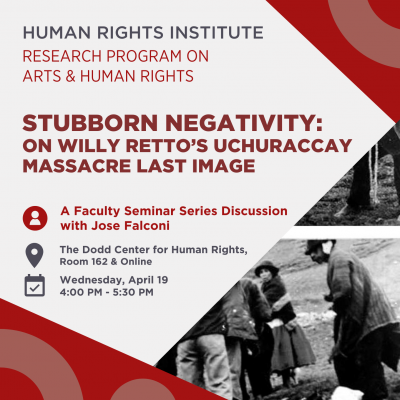 Stubborn Negativity: On Willy Retto’s Uchuraccay Massacre Last Image
Stubborn Negativity: On Willy Retto’s Uchuraccay Massacre Last Image
Wednesday, April 19, 2023 | 4:00 pm - 5:30 pm
José Falconi
The last film shot by photographer Willy Retto captures the killings of himself and several journalists by villagers in Uchuraccay, Peru in 1983, during the country's internal conflict. Despite the photographic evidence, many remained unconvinced as to the events that transgressed and the images shrouded in mythology. This talk reflects on the power of images to provide testimony of the past, while also resisting the linear progress of time. It considers the internal logic and desynchronization between word and image that can contribute to the fog of mythology surrounding historical events. Through this unresolved tension, we uncover a thought-provoking reflection on the complex relationship between images, memory, and history.
About José Falconi
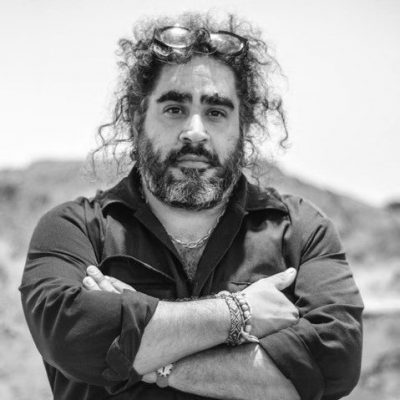 José Luis Falconi is a professor of art and human rights at the University of Connecticut, as well as the president of Cultural Agents, Inc., an NGO which promotes civic engagement and creativity through artistic education. From 2001 to 2011, Falconi was the art forum curator at the David Rockefeller Center for Latin American Studies at Harvard University, curating more than thirty shows of cutting-edge Latino and Latin American artists in an academic setting. From 2011 to July 2017, he was an associate of the Department of Art History and Architecture at Harvard University, where he received his doctorate in romance languages and literatures in 2010, and his post-doctorate the following year in the history of art and architecture under the supervision of Prof. Thomas Cummins.
José Luis Falconi is a professor of art and human rights at the University of Connecticut, as well as the president of Cultural Agents, Inc., an NGO which promotes civic engagement and creativity through artistic education. From 2001 to 2011, Falconi was the art forum curator at the David Rockefeller Center for Latin American Studies at Harvard University, curating more than thirty shows of cutting-edge Latino and Latin American artists in an academic setting. From 2011 to July 2017, he was an associate of the Department of Art History and Architecture at Harvard University, where he received his doctorate in romance languages and literatures in 2010, and his post-doctorate the following year in the history of art and architecture under the supervision of Prof. Thomas Cummins.
His latest academic publications include Portraits of an Invisible Country: The Photographs of Jorge Mario Múnera(2010), A Singular Plurality: The Works of Darío Escobar (2013), The Great Swindle: A Project by Santiago Montoya (2014) and Ad Usum / To be used: The Works of Pedro Reyes (2017). His monograph on Mexican artist Pia Camil, There are no Friendly Fires, will be published in 2022.
In the United States, Falconi has been appointed lecturer in the Department of Art History and Architecture at Brandeis University (2014-2020), at Boston University in the spring of 2016, and in the School of Fine Arts at the University of Connecticut in the spring of 2021. In Latin America, he was “bicentennial” Visiting Professor of Aesthetics at the University of Chile (Santiago de Chile, 2012 and 2019), “International Professor” at the National University of Colombia (Bogotá, 2013), visiting professor at the Center for Latin American Studies “Manuel Galich” at the Universidad San Carlos of Guatemala (2016), and Distinguished Visiting Professor at the University of Costa Rica (2017).
Health in Ruins: The Capitalist Destruction of Medical Care at a Colombian Maternity Hospital
Tuesday, April 11, 2023
4:00 pm - 5:30 pm
Humanities Institute Conference Room
In-Person & Online
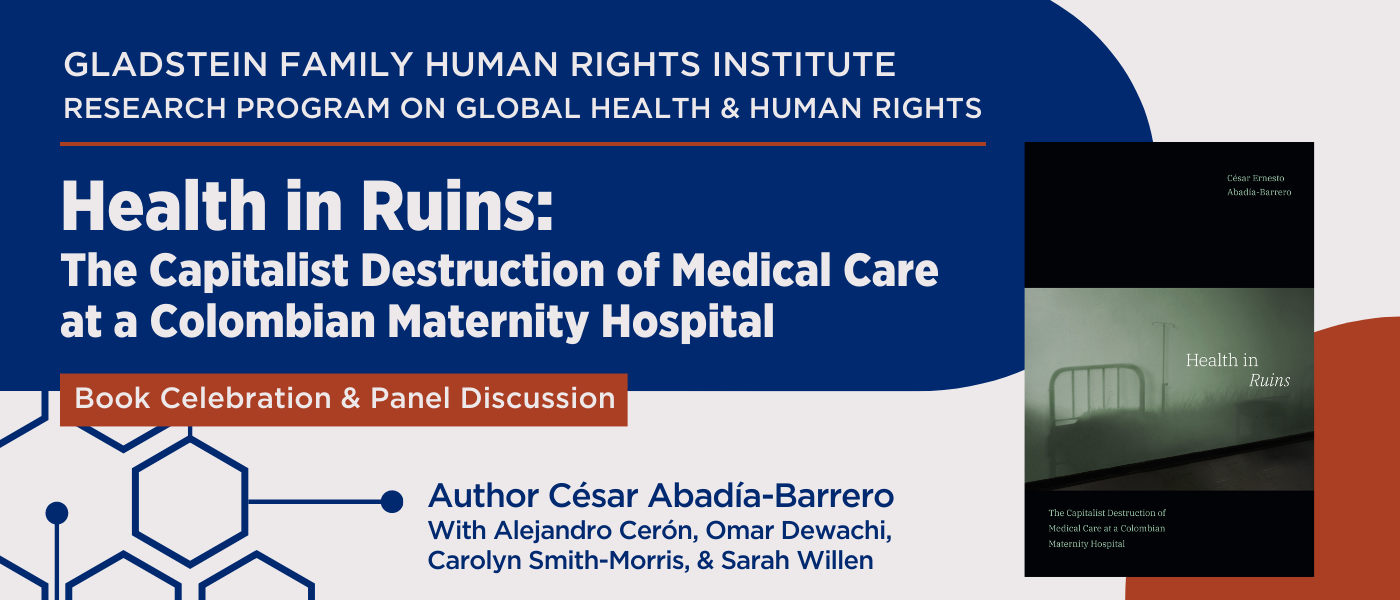
About This Event:
Join us for a panel celebrating Professor César Ernesto Abadía-Barrero’s new book, Health in Ruins, which chronicles the story of El Materno—Colombia’s oldest maternity and neonatal health center and teaching hospital—over several decades as it faced constant threats of government shutdown.
This team-based and collaborative ethnography analyzes the social life of neoliberal health policy. The book shows that health care privatization is not only about defunding public hospitals; it also ruins rich traditions of medical care by denying or destroying ways of practicing medicine that challenge Western medicine.
Our panel will include an overview of the book by Prof. Abadía-Barrero, followed by comments from three internationally renowned experts in medical anthropology and global health. The electronic version of the book is available from the UConn Library or Duke University Press.
Join us!
We kindly ask that you register to attend regardless of the modality you will join.
In-person:
Humanities Institute Conference Room,
4th Floor of Homer Babbidge Library
Reception from 3:30 - 4:00 pm.
Online:
Register for Zoom details
Reception
Those joining us in-person are encouraged to join us for a reception ahead of the event at 3:30 pm in the same room. Refreshments will be served.
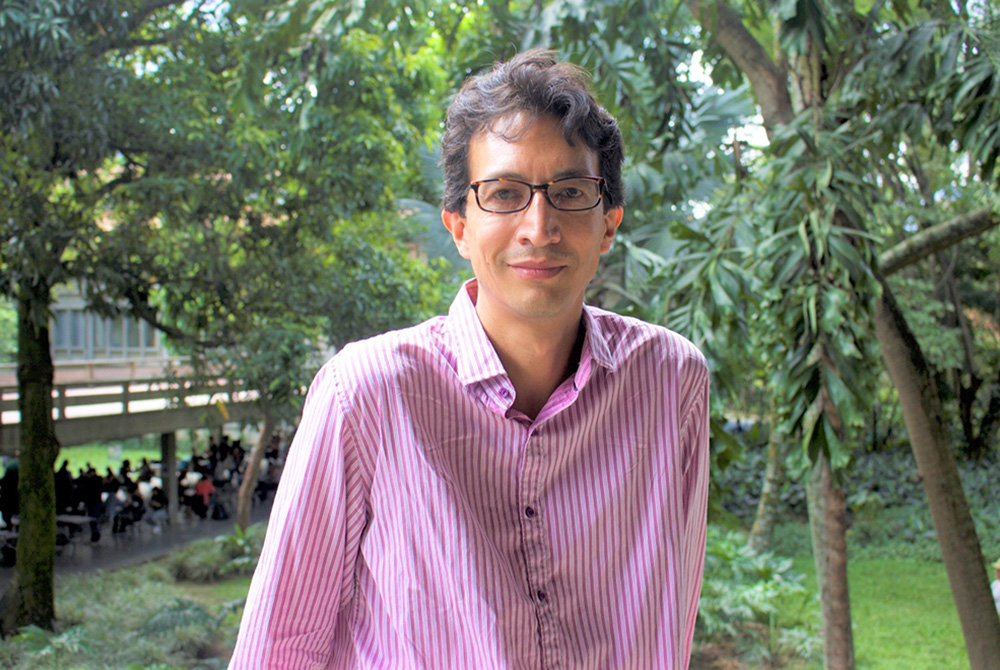
About César Abadía-Barrero:
César E. Abadía-Barrero is Associate Professor of Anthropology and Human Rights at the University of Connecticut. A medical anthropologist, his research integrates different critical perspectives in the study of how for-profit interests transform access, continuity, and quality of health care. He has conducted activist-oriented research in Brazil and Colombia, focusing on healthcare policies and programs, human rights judicialization and advocacy, and social movements in health. He is the author of I Have AIDS but I am Happy: Children’s Subjectivities, AIDS, and Social Responses in Brazil (2011, English and Portuguese editions) and Health in Ruins: The Capitalist Destruction of Medical Care (2022, English and Spanish editions). His current collaborative research follows decolonial proposals in health and wellbeing after Colombia’s 2016 peace accord.
Our Panel:
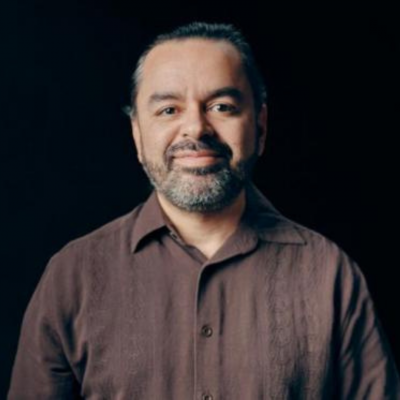
Alejandro Cerón
Associate Professor of Anthropology, University of Denver
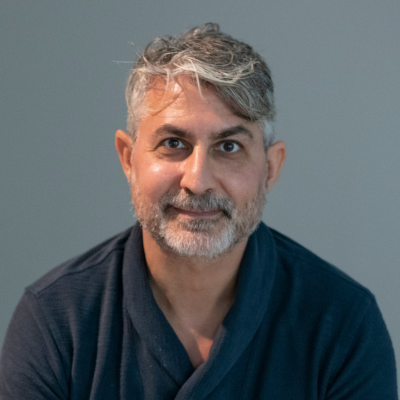
Omar Dewachi
Radcliffe Fellow, Harvard University
Associate Professor of Medical Anthropology and Global Health, Rutgers University
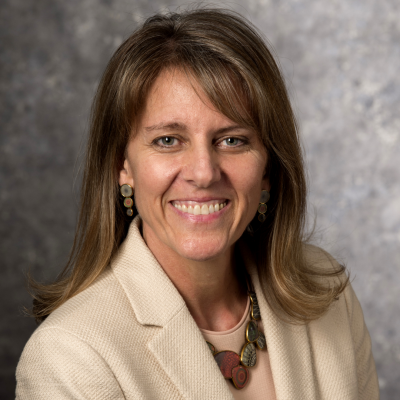
Carolyn Smith-Morris
Professor, School of Public Health, UT Southwestern Medical Center
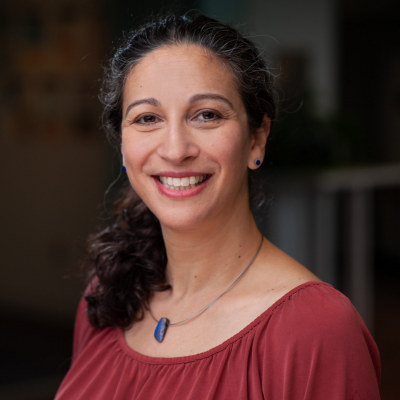
Sarah Willen (Moderator)
Associate Professor of Anthropology, University of Connecticut
Co-Director, Research Program on Global Health & Human Rights
The Research Program on Global Health and Human Rights serves as a forum for UConn’s scholarly community interested in global health, human rights, and health inequities. This program is an integral part of the Human Rights Institute, seeking to understand human rights based approaches to health challenges.
Human Rights Film+ Series: After Zero Tolerance
Wednesday, March 22, 2023
5:00pm - 6:30pm
In-Person Event
Konover Auditorium, The Dodd Center for Human Rights
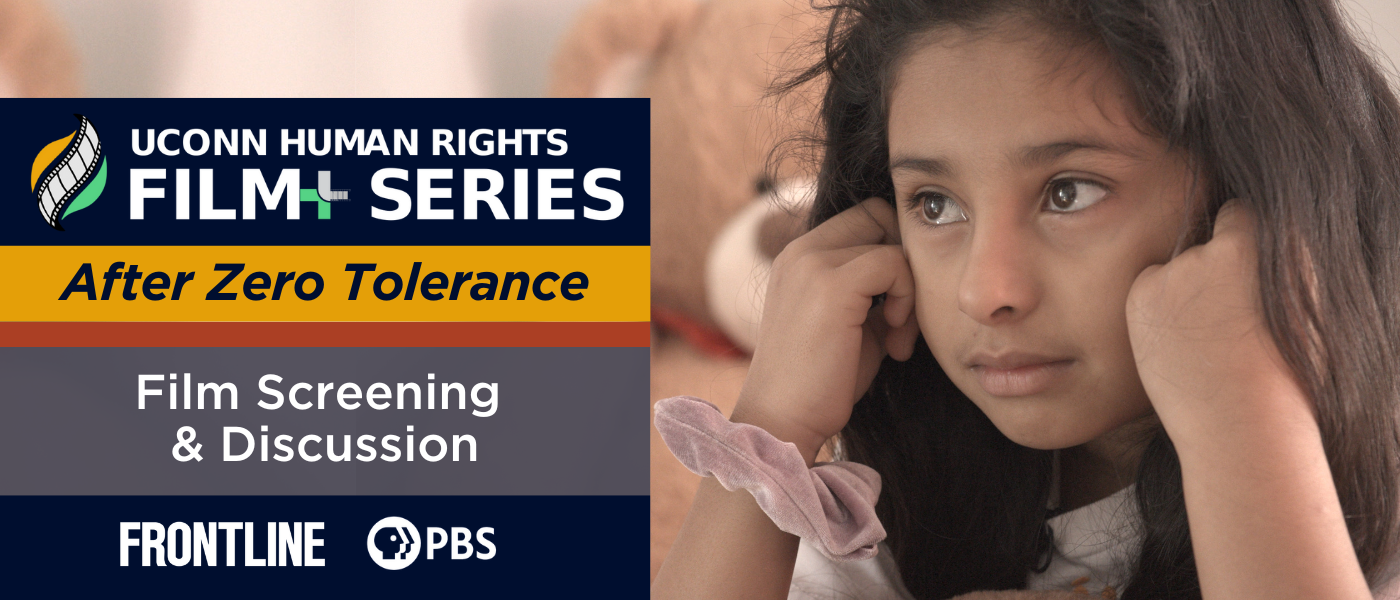
About ‘After Zero Tolerance’
Directed by Emmy™ Award-winning filmmaker and UConn DMD Associate Professor Oscar Guerra, After Zero Tolerance brings a compelling and intimate perspective to the ongoing debate around US immigration policy and the treatment of families and children at the border. The film follows the story of Anavelis, who crossed the U.S.-Mexico border with her then-six-year-old daughter, Genesis, in 2018. They were forcibly separated by law enforcement at a border camp, and Anavelis was deported back to Honduras without Genesis – kicking off a years-long quest to reunite with her daughter.
This event will feature a full screening of After Zero Tolerance (2022, 29 minutes), followed by a discussion with Oscar Guerra, Ann Garcia, Nan Schivone, and Anavelis.
Our Guests:
- Prof. Oscar Guerra, After Zero Tolerance filmmaker and Associate Professor, UConn Department of Digital Media & Design
- Ann Garcia, Attorney, National Immigration Project
- Nan Schivone, Legal Director, Justice in Motion
- Anavelis, After Zero Tolerance film protagonist
Moderator:
- Prof. Catherine Masud, Assistant Professor in Residence, UConn Gladstein Family Human Rights Institute and Department of Digital Media & Design
For a preview of the film, watch the above excerpt (3 minutes).
After Zero Tolerance is a FRONTLINE production with Five O’Clock Films in association with Guerra Productions, the Syracuse University S.I. Newhouse School of Public Communications and the University of Connecticut. The writer, producer and director is Oscar Guerra. The senior producer is Frank Koughan.
This event is sponsored by the Gladstein Family Human Rights Institute, Dodd Impact, and the Department of Digital Media & Design. We kindly ask you register to join us.
Encounters Series – Spring 2023 Program

About the Program:
Through the Democracy and Dialogues Initiative, UConn is working to increase democratic and civic capacity by supporting community dialogues on critical issues, providing moderator and facilitation training for dialogues and deliberations, and partnering with campus colleagues and local institutions to increase meaningful participation by all community members.
The Encounters Series is dedicated to fostering unexpected conversations around divisive issues and obscure knowledge. The program dives deeply into subjects that are of interest to the Greater Hartford community through facilitated, small-group dialogues followed by a question-and-answer style conversation with our UConn faculty and community partners. Resources are provided beforehand to encourage informed and informal dialogue within conversations that may otherwise prove to be polarizing, and thus unproductive. The aim is to strengthen our ability to know ourselves and to develop a forum for respectful and challenging dialogue.
Our partners in this Encounters Series include the Hartford Public Library, Connecticut's Old State House, the HartBeat Ensemble, the Wadsworth Atheneum Museum of Art, Connecticut Humanities, and many valuable others. The Democracy & Dialogues Initiative is part of Dodd Human Rights Impact and supported at UConn by the Office of Global Affairs, the Office of the Provost, College of Liberal Arts & Sciences, Humanities Institute, UConn Extension, and the Division of Student Affairs’ Parent's Fund.
Join us!
You are warmly invited to take part in this series of interactive dialogues. To participate, please register below.
March 4 – Encounters: Historic Black Journalism and Its Legacy
Historic Black Journalism and Its Legacy
In partnership with Capital Community College, Connecticut's Old State House, CT Humanities, the Hartford Heritage Project, and the Wadsworth Atheneum Museum of Art.
Saturday, March 4 | 10:00 AM - 12:30 PM
Capital Community College - Community Room, 2nd Floor.
950 Main St., Hartford, CT 06103
Register in advance for this event:
s.uconn.edu/encounters/black-press
As a journalist and a historian, Jelani Cobb, this year’s Pennington lecture speaker, has used public media to present deeply researched long-form journalism on pressing issues. He is a part of a long tradition of Black journalists who have done so. Join us for this community conversation event to explore the history and legacy of Black writing, Black journalists, and advocacy in and through the Black press. This Encounters program is part of the 2023 Pennington Lecture Event, inspired by this year’s speaker, Jelani Cobb.
*A light lunch will be served after the event. All participants are welcome and there is no cost to register or attend.
April 11 – Encounters: Destigmatizing Intimate Partner Violence-The Alyssiah Wiley Program
Destigmatizing Intimate Partner Violence-The Alyssiah Wiley Program
Hosted by Capital Community College & The Alyssiah Wiley Program
Tuesday, April 11 | 1:00 PM - 3:00 PM
Capital Community College, 2nd Floor Community Room
950 Main St., Hartford, CT 06103
Register in advance for this event:
http://s.uconn.edu/alyssiahwiley-dialogue
Domestic violence is a pervading issue across our world. During the fiscal year of 2021, over 38,989 people sought domestic violence services in the state of Connecticut alone. This number is not reflective of all those who endure domestic violence, as violence often goes unreported. We need to shatter the silence. Through education, engagement, and empowerment, this program will shed light on domestic violence and encourage social change. Join us as we learn, listen, and reflect through small group discussions with facilitators, and engage with experts in domestic violence services about this critical issue.
*A light lunch will be provided ahead of the dialogue at 12:30 pm. All participants are welcome and there is no cost to register or attend.
April 15 – Encounters: Reparations-A More Perfect Union?
Reparations - A More Perfect Union?
Hosted by the Hartford Public Library Albany Branch
Saturday, April 15 | 10:00 AM - 12:00 PM
Hartford Public Library Albany Branch
1250 Albany Avenue, Hartford, CT 06112
Register in advance for this event:
http://s.uconn.edu/reparations
Have you ever wondered about the lingering impact of historical injustices and how they continue to shape our society today? The issue of slavery reparations has been at the forefront of conversations surrounding social justice and equity, and now is the time to engage in a thoughtful and thought-provoking dialogue on the topic.
Join us for a captivating and enlightening discussion on the complex and multifaceted issue of reparations for slavery. Together, we will explore the historical context and current implications of systemic inequalities, and examine if reparations could serve as a means of redressing these injustices. Whether you are an advocate for reparations or skeptical of their efficacy, this dialogue promises to challenge your thinking and deepen your understanding of this critical issue.
Don't miss this opportunity to be a part of the conversation on reparations and help shape the future of our society. Join us for an insightful and inspiring dialogue that is sure to leave a lasting impression.
*A light lunch will be provided following the dialogue at 12:00 pm noon. All participants are welcome and there is no cost to register or attend.
April 29 – Encounters: Amistad: Artistic Perspectives
Amistad: Artistic Perspectives
Hosted by Connecticut's Old State House & Connecticut Freedom Trail
Saturday, April 29 | 10:00 AM - 12:00 PM
Connecticut's Old State House
800 Main St., Hartford, CT 06103
Register in advance for this event:
https://forms.gle/ov8NUHwum8Wjhdps8
Artists from all over the world have raised the Amistad saga beyond the history books. In 1839, fifty-three African captives rebelled onboard the Spanish ship, La Amistad. They took over the ship, but were recaptured and then went on to win back their freedom through the American courts in Connecticut. Their bravery and eventual victory has been immortalized in the history books. But long before historians began to examine the Amistad saga, artists had already claimed the story in their own work. From contemporary portraits of the Africans to modern day stage performances, artists have told us the story of Amistad from diverse and unique perspectives.
What can these works tell us about their subjects and the artists that remember them? What happens when different interpretations come at odds with each other? Can a viewer’s perspective clash with the artist’s? Join us for an informed and collaborative exploration of these fascinating questions!
The Encounters Series is dedicated to fostering unexpected conversations around divisive issues and obscure knowledge. The program dives deeply into subjects that are of interest to the Greater Hartford community through facilitated, small-group dialogues followed by a question-and-answer style conversation with our UConn faculty and community partners. Resources are provided beforehand to encourage informed and informal dialogue within conversations that may otherwise prove to be polarizing, and thus unproductive. The aim is to strengthen our ability to know ourselves and to develop a forum for respectful and challenging dialogue.
Lead a Dialogue!
We are always looking for more facilitators and moderators to help support the Encounters Series. If you are interested in getting involved, register for one of our trainings!
February 10 – Facilitator Training
Facilitator Training
Hosted by the Democracy & Dialogues Initiative
Friday, February 10 | 1:00 PM - 3:30 PM
Online
Register in advance for this training:
http://s.uconn.edu/fac.training
Facilitators are fundamentally important to running a successful dialogue. They are the folks who work with the small breakout groups and keep the conversation moving and productive. Want to learn more about the theory and practice of facilitation? Join us virtually on February 10.
March 6 – Facilitator Training
Facilitator Training
Hosted by the Democracy & Dialogues Initiative
Monday, March 6 | 1:00 PM - 3:30 PM
In-person: The Dodd Center for Human Rights, Room 162.
405 Babbidge Rd., Storrs, CT 06269
Register in advance for this training:
s.uconn.edu/trainingform
Facilitators are fundamentally important to running a successful dialogue. They are the folks who work with the small breakout groups and keep the conversation moving and productive. Want to learn more about theory and practice of facilitation? Join us! A light lunch will be provided.
March 9 – Moderator Training
Facilitator Training
Hosted by the Democracy & Dialogues Initiative
Thursday, March 9, 2023 | 9:00 AM - 11:00 AM
Online: Zoom
April 20 – Facilitator Training
Facilitator Training
Hosted by the Democracy & Dialogues Initiative
Thursday, April 20 | 10:00 AM - 12:30 PM
In-person: The Dodd Center for Human Rights Lounge
405 Babbidge Rd., Storrs, CT 06269
Register in advance for this training:
http://s.uconn.edu/encounterstraining2023
Facilitators are fundamentally important to running a successful dialogue. They are the folks who work with the small breakout groups and keep the conversation moving and productive. Want to learn more about theory and practice of facilitation? Join us!
April 21 – Moderator Training
Facilitator Training
Hosted by the Democracy & Dialogues Initiative
Friday, April 21 | 9:00 AM - 11:00 AM
Online: Zoom